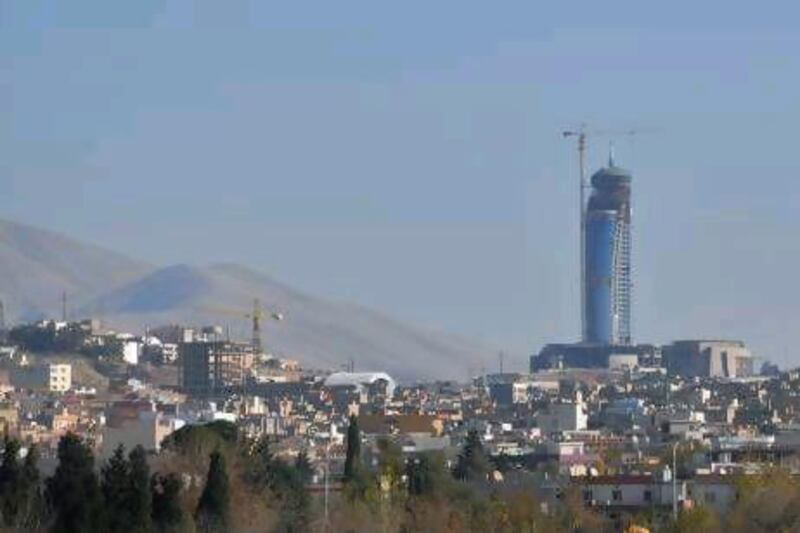Why Sulaimaniyah?
Sulaimaniyah is the cultural and entertainment capital of the fast-developing and semi-autonomous Iraqi Kurdistan. And on March 21, it proudly celebrates Nowruz - the Kurdish New Year - for at least a few weeks. Located near the Iranian border, north-east of Iraq proper and more than two hours by car from Erbil (the Kurdish capital), Suly, as it is nicknamed, has a metropolitan population of two million. Some regard Sulaimaniyah as "the Paris of Iraq" because of the liberal lifestyle, tree-lined boulevards and pleasant weather, but most of all for its cultural and entertainment scene. The city is dotted with museums and art galleries, and is the home of many famous Iraqi-Kurdish singers, poets, writers, journalists and politicians (including Jalal Talabani, Iraq's current president).
But as the US troops departed from Iraq late last year, they left behind their culture: futuristic skyscrapers dominate the mountain views, new shopping malls have opened and a cinema culture is spreading. While in most parts of Iraq the Americans were seen as invaders, here they are called liberators. In fact, the people of Sulaimaniyah seem to be obsessed with "Amrika".
A comfortable bed
This year, three new Millennium- and Copthorne-managed hotels will open up in the city. The opulent Grand Millennium Sulaimaniyah will be a lookalike of Dubai's Burj Al Arab. The 28-storey tower will have 256 rooms and suites and a revolving fusion restaurant. Next week, a four-star Copthorne Baranan Hotel will open in Sarchinar.
LaleZar Hotel (www.lale-zar.com; 00 964 53 319 2602) on Sarchinar Hill, a few minutes from the downtown area, has large rooms with majestic views of the city, and offers free Wi-Fi, has a gym and spa, and its restaurant prepares some of the best food around town. Double rooms cost around US$140 (Dh515).
For those with a lower budget, the three-star Dawa Hotel (www.dawahotel.com; 00 964 748 015 6260), close to City Cinema, has simply decorated rooms but offers free internet and breakfast. Double rooms cost fromUS$100 (Dh367) per night.
Find your feet
Start from Salem Street, which looks like a miniature version of Dubai's Sheikh Zayed Road. The World of Heritage shop (00 964 53 313 1582) sells all kinds of antiques and souvenirs, including Kurdish rugs and antique telephones and radios (and everything in between).
A two-minute walk will bring you to Slemani Museum (00 964 53 312 0609; admission free; open 8.30am to 2.30pm), one of the most important archaeology museums in the Middle East. Proudly showcased are ancient Mesopotamian civilizations from the Palaeolithic Age (circa 15,000BC) to the Islamic Abbasid Period. The museum's most interesting displays include a ceramic coffin containing the skeleton of a 6,000-year-old woman, a Greek statue of Hercules dating to 334BC and many other objects found in recent excavations in Iraq.
Despite the well-stocked archaeology museum, Suly is a relatively new city on the Mesopotamian map (in comparison to the other millennia-old Iraqi cities).
Near the museum is the Central Public Library with statues of famous local writers erected on its front lawn. Across the street is the Parki Gal or People's Park.
Meet the locals
The crowded Mawlawi Street is where residents come to shop or drink chay (Kurdish tea) served in tiny tulip-shaped cups at the chaykhanas (teahouses). Head to Kawa Street and visit Chaykhanay Sha'ab (People's Teahouse; open 6am-7pm), where you can freely discuss politics with the locals. Recently opened in Shoresh is the Italian-Kurdish Caffe11, which takes you back to nature (its walls are covered with photographs by acclaimed photographer Jamal Penjweny).
Book a table
Dawa Restaurant, located at the top floor of the eponymous Dawa Hotel (Sarchinar; 00 964 748 015 6260), is a highly popular restaurant. Waiters will start placing different kinds of grilled items, salads, rice and more, on your table the moment you sit. And these are only "the appetisers". After this, you can then start ordering from the typical Middle Eastern menu - that's if you're still hungry. A dinner for two, which also includes a selection of juices, costs around $50 (Dh184).
Shaped like a spaceship, Avesta Restaurant (00 964 770 778 8873), also in Sarchinar, is famous for its Italian and French cuisine, besides the usual Middle Eastern dishes. The excellent food is complemented with a live band. Dinner for two costs around $40 (Dh147).
Shopper's paradise
Sulaimaniyah has many shopping malls, with many more under construction. But for the best experience, visit the traditional bazaar, which has everything from fruits to imitation designer bags. Head to the market around the 18th-century Grand Mosque, near Mawlawi Street, for Kurdish sweets and rugs.
What to avoid
Iraq is still mostly a cash-based society. Bring as much cash as possible (in US dollars - it's almost the official currency in Iraq).
Don't miss
To understand the Kurds' recent history, head to Amna Suraka (Red Security) Museum (21st St; 9am to 4pm, Saturday to Thursday). Until 1991, when the Kurds - with the help of the western-imposed No Fly Zone - created their own autonomous region after an uprising, Saddam Hussein's notorious Mukhabarat, the Iraqi Intelligence Service, used this imposing red building as its northern headquarters.
The former detention centre was converted into a museum in 2003 by the current first lady of Iraq, Hero Talabani. On display at the museum are Iraqi tanks, artillery, mortars and other weapons.
Return flights to Sulaimaniyah from Dubai with Flydubai (www.flydubai.com) cost from Dh2,699.





